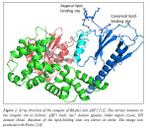The main idea of this project was that by inhibiting at least one of these two interactions of GluA2, the internalization of AMPAR will be reduced and therefore the synapse resistance will be increased, thus leading to improved cognitive functions.

Initiation of α-amino-3-hydroxy-5-methyl-4-isoxazolepropionic acid receptor (AMPAR) internalization requires the interaction of the C-terminus of GluA2 with two proteins:
The main idea of this project was that by inhibiting at least one of these two interactions of GluA2, the internalization of AMPAR will be reduced and therefore the synapse resistance will be increased, thus leading to improved cognitive functions.
CRU Hungary Kft Göd, Hungary
Lilla Ravasz, PhD Student
Dániel Mittl, PhD Student
Dominik Mátyás, PhD Student
Ildikó Papp, Dr.
Gábor Juhász,Dr,
Medicinal Chemistry Research Group, Research Centre for Natural Sciences, Budapest, Hungary
Dávid Bajusz, PhD Student
György Miklós Keserű, Dr.
Alexandru Ioan Cuza University, Iași, Romania
Lucian Hrițcu, Dr.
Generation of 2-3 peptides with the potential to improve cognitive functions
Highly effective inhibitors of AMPAR internalization were identified using structure-based design of peptides able to inhibit STEP-GluA2-CT complex formation. Two short peptide derivatives were found as efficient in vitro inhibitors. Our in vivo experiments evidenced that both peptides restore the memory deficits and display anxiolytic and antidepressant effects in a scopolamine-treated rat model. The interference peptides identified and characterized represent promising lead compounds for novel cognitive enhancers and/or behavioral modulators.
Poster presentation at the 37th Annual Protein Society Symposium at Boston (USA): „Rationally Designed Peptides Improve Cognition in Rats”, HS. Szedlacsek; D. Bajusz; RA. Badea; A. Pop; CC. Bică; L. Ravasz; D. Mittli; D. Mátyás; G. Necula-Petrăreanu; CV. Munteanu; I. Papp; G. Juhász; L. Hritcu; K. György; ȘE. Szedlacsek; July 13-16, 2023
Published papers: „Designed Peptide Inhibitors of STEP Phosphatase-GluA2 AMPA Receptor Interaction Enhance the Cognitive Performance in Rats”: Szedlacsek HS, Bajusz D, Badea RA, Pop A, Bică CC, Ravasz L, Mittli D, Mátyás D, Necula-Petrăreanu G, Munteanu CVA, Papp I, Juhász G, Hritcu L, Keserű GM, Szedlacsek SE, https://pubmed.ncbi.nlm.nih.gov/34962802/, https://doi.org/10.1021/acs.jmedchem.1c01303; Published online: 28 December 2021; Published in issue: 13 January 2022; IF = 7,45
Seminar IBAR: 16 june 2023
Oral lecture: "Designed Peptide Inhibitors of STEP Phosphatase-GluA2 AMPA Receptor Interaction Enhance the Cognitive Performance in Rats"; Professor Stefan Szedlacsek
Invited lectures/speaker 2023: